In This Issue:
- 25th Anniversary of Washington Semester
- Letter from the Department
- Q&A with Woodson-Martin Democracy Fellow
- Q&A with Cline Scholarship Recipient Bayan Peikari
- CGE/Study Abroad Reflections, by Rob Alexander
- Faculty Research Piece, by Jaimee Swift
- Salamanca FMIR Reflections, by Kristin Wylie
- Featured Alumni
Featured Story
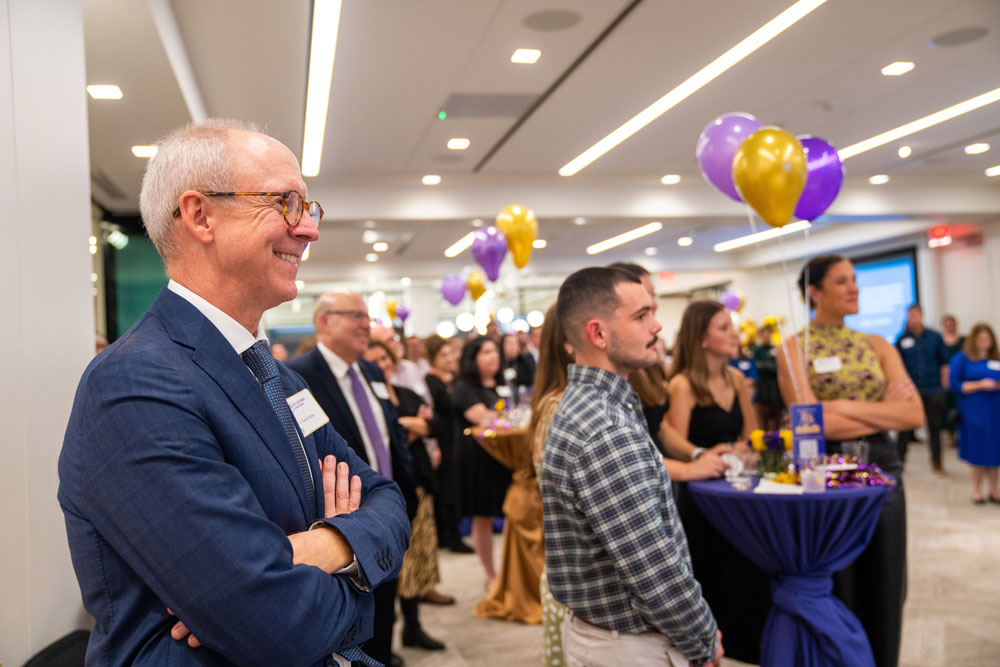
Washington Semester's 25+ Years of Alumni Engagement
By David A. Jones
Alumni have been the animating force of JMU Washington Semester from the beginning. Spring 2000 was my first semester as the program's Faculty Member in Residence, and, as an academic, I was clueless about how to provide students with meaningful career guidance. That was a glaring problem: students expect Washington Semester to help them launch a career in politics, policy, and related fields, and I didn't know how to guide them.
Letter from the Department Head
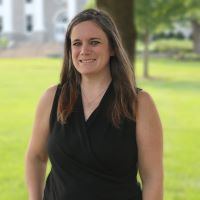 We tend to stay busy here in Miller Hall. When I review students’ résumés to write letters of recommendation or when colleagues and I review applications for awards and opportunities, I find myself marveling at the fact that our students fit so many endeavors into the finite 24-hour span of a day. Similarly, our faculty are adept at multitasking, excelling not only in their teaching but also in cutting-edge research and meaningful service roles. And, of course, our alumni continue to impress and inspire me with their enthusiastic support for current Dukes and their involvement in mentorship and professional development efforts here on campus. When a community of faculty, staff, students, and alumni is committed to public service—in the local, national, and global spheres—there is never a dull moment. As you will read in this issue, this year has been a year of connection- and community-building.
We tend to stay busy here in Miller Hall. When I review students’ résumés to write letters of recommendation or when colleagues and I review applications for awards and opportunities, I find myself marveling at the fact that our students fit so many endeavors into the finite 24-hour span of a day. Similarly, our faculty are adept at multitasking, excelling not only in their teaching but also in cutting-edge research and meaningful service roles. And, of course, our alumni continue to impress and inspire me with their enthusiastic support for current Dukes and their involvement in mentorship and professional development efforts here on campus. When a community of faculty, staff, students, and alumni is committed to public service—in the local, national, and global spheres—there is never a dull moment. As you will read in this issue, this year has been a year of connection- and community-building.
Every time our alumni talk with our current students about the paths one can take from any of our three majors to an incredibly wide range of professions from public service to private sector, they model the engaged citizens our students can be. As Dr. David Jones writes in his reflection on the Washington Semester’s 25+ years of alumni engagement, our alumni are a critical bridge between college and career. Our alumni show our students the limitless opportunities they can pursue, helping them to see who they can be.
You can read here about two of our alumni and their experiences at James Madison University and after, Sarah Massey (’08) and Christopher Mulkins (’00). This issue also highlights two of our current students and the ways in which they are making the most of their time at JMU. Gabriela Leija-Hernandez discusses the Woodson-Martin Democracy Fellowship and Bayan Peikari reflects on the Paul Cline Scholarship.
Our new faculty member, Robin Leiter-White, has already made her mark on JMU and become a valued mentor to our Pre-Law, Legal Studies, and Moot Court students. Professor Leiter-White has brought insights from her legal career to campus, developing a new course on housing policy and offering in-demand courses, Constitutional Law, Civil Rights, and Appellate Process.
Faculty in the Department of Political Science have worked to deepen connections between Harrisonburg and the world. Dr. Kristin Wylie writes in this issue about her time in Salamanca as the Faculty Member in Residence for JMU’s Semester in Spain study abroad program. Dr. Rob Alexander and Dr. Seán McCarthy (Writing, Rhetoric, and Technical Communication) designed and led a new, and award-winning, summer study abroad program, XLabs International: Innovative Responses to Sustainability in the Netherlands and Germany.
Our faculty also work to foster connections and celebrate legacies closer to home. Dr. Jaimee Swift has taken up the task of compiling an anthology on the life, leadership, and legacy of Dr. Joanne V. Gabbin. Dr. Swift’s discussion here offers a glimpse at Dr. Gabbin’s inspiring work and the anthology soon to come.
This summer, a few of our programs will experience leadership changes, transitioning from one talented colleague to another. Our Washington Semester program, guided for two and a half decades by Dr. David Jones, will gain a new director, Dr. Edward Yang. Dr. Yang has served as the spring Faculty Member in Residence for five terms and he brings both valuable experience and new ideas to the role. Dr. Jones will not be far away, as he will remain the fall Faculty Member in Residence and will step into the department’s new Alumni Coordinator role. Our Master of Public Administration program, led by Dr. Jennifer Taylor for the past three years, will be led by co-directors Dr. Sombo Muzata and Dr. Rob Alexander, beginning July 1st. Our faculty members’ eagerness to serve our students, alumni, and community is an illustration of the strong community we have built together in the Department of Political Science.
The Department of Political Science is a vibrant academic community, and we look forward to continuing our efforts to build connections within Miller Hall, on JMU’s campus, and in our local, national, and global communities.
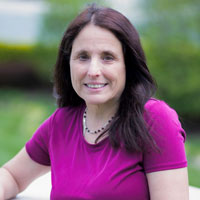
Robin Leiter-White, Lecturer
Robin Leiter-White is a Lecturer in Political Science specializing in judicial politics and public policy. She teaches courses on Constitutional Law, Civil Rights and Civil Liberties, Appellate Process and Practice, and Housing Law and Policy. She is also a Pre-Law Advisor and faculty advisor to the James Madison University Moot Court Team, which competes at collegiate moot court tournaments. She earned her B.A. from the University of Virginia and her J.D. at the University of Richmond School of Law.
Professor Leiter-White also teaches a course on Housing Law and Poverty at the University of Virginia School of Law. Before coming to JMU, she was the senior managing attorney at Central Virginia Legal Aid Society (CVLAS) in Charlottesville, VA. At CVLAS, she represented hundreds of low-income clients in state and federal courts throughout Virginia in cases involving landlord-tenant disputes, subsidized and public housing, fair housing, foreclosure prevention, lease-to-own contracts, manufactured homes, predatory lending, automobile fraud, repossessions, debt settlement scams, debtors' rights, debt buyers' issues, fair debt collection practices and fair credit reporting.
Professor Leiter-White served as co-counsel in Simmons v. T.M. Associates Management, INC., a 4th Circuit case which held that a residential landlord's refusal to consider overlooking a rental applicant's disability-related criminal history as a reasonable accommodation in the landlord's admission policy violated the Fair Housing Act.
Before her legal aid career, she worked in private practice representing plaintiffs in pharmaceutical, consumer, employment, securities, insurance, environmental, and product liability class actions and mass torts in Pasadena, California, and clerked for Judge John F. Daffron Jr. in Chesterfield County Circuit Court in Chesterfield, Virginia.
Q&A with Woodson-Martin Democracy Fellow Gabriela Leija-Hernandez ('21)
Please introduce yourself and tell us a little about your interest in civic engagement.
My name is Gabriela Leija-Hernandez and I graduated from JMU in May of 2021 with a major in political science and a minor in non-profit studies. For me, a lot of the activities that I did as an undergrad were intertwined with my major and minor. I really like the POSC department because I think a lot of the course work is interdisciplinary. I am really interested in working in local government and spending time with communities that I hope to advocate for including but not limited to marginalized groups, the refugee and immigrant population and the local population. Being born here in the Shenandoah Valley, it is a part of my everyday life and I want to continue that. This is where my current job factors in; I feel like I am able to continue what I did in my undergraduate experience. I am really passionate about advocacy work and organizing events for students and individuals who don’t have a lot of interaction with our local community.
What led you to apply for your current position, the Woodson-Martin Democracy Fellow?
After I graduated from JMU, I definitely wanted to continue my schooling but after reevaluating, I realized that I wanted to do more practical work and have some applied experience first. I wanted to be at JMU and apply some of the work from my courses. With my current job at the Madison Center for Civic Engagement, I have that opportunity. I like the idea of being able to bridge the gap between the JMU community and the local community because I have been a part of both.
Could you tell us a bit more about your role at the Center for Civic Engagement?
In my specific role, we do a lot of events that are educational in nature, and open a space for conversation. It is an opportunity for post-graduate students to serve the community and build connections with JMU students as well. Our events reflect the overall mission of the Center and specifically the mission of the fellowship, which aims to expand the role of marginalized communities in the electorate, help remove barriers to civic engagement and to collaborate with local immigrant and refugee communities regarding civic engagement opportunities. For example, we work to make materials accessible regarding elections because information is often only in English, or if there is a Spanish translation, it is outdated. We have been working with the Hispanic Heritage Festival to update Spanish language materials and to reach out to communities that may not have traditionally participated in the political process. Our outreach is not just limited to voting; civic engagement is a lot more than just voting. We aim to educate people on legislation that might affect their community, for example, even if they are not eligible to vote.
What are some of the current projects that you are working on?
Last semester, we focused a lot on larger-scale events and this semester we are working on connections with new partners such as New Bridges and the Latin-American/Latin-X/Caribbean studies minor here at JMU. This semester we want put on a deliberative dialogue series that gives students and faculty a chance to talk about issues that they might otherwise want to avoid. We are providing an issue guide on immigration and we are working to launch a new blog called “Democracy Docket,” that will discuss current domestic and international issues. For example, we will have a discussion on DACA (and the progress of the Dream Act) and on the anniversary of the war in Ukraine. Last semester we put on an event before election day called “Civic Engagement Beyond Voting and Citizenship” and the purpose was to talk about the barriers to civic engagement. We showed two short films that featured students who were discouraged with their legal status, and one of them came to share her story in person with our students. She talked about how she was able to pursue her education and earn a college degree despite barriers that resulted from her legal status, and how even though she could not vote, she could be civically engaged in other meaningful ways. For example, she organized a rally and became involved in lobbying efforts. That was one of my favorite programs because not only were we able to have a human feel to the discussion but also to have representatives from non-profit organizations talk about the role they can play when the government has been taking a while to act in passing legislation. We were able to talk about how it can feel discouraging around this time of year and how for some people and communities it is about more than just voting or saying yes or no. It was a good eye-opener, too, especially the discussion about what civic engagement looks like beyond just voting.
Q&A with Cline Scholarship Recipient Bayan Peikari (’24)
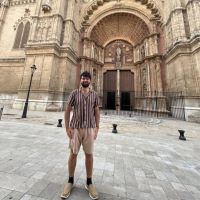 Reflections on the Paul Cline Scholarhip
Reflections on the Paul Cline Scholarhip
Bayan Peikari (’24)
What led you to decide to apply for the Cline Scholarship?
I chose to apply for the Cline Scholarship because it provided a special chance to participate in extracurricular learning. The prospect of taking part in conferences, role-playing, and internships that I might not have been able to afford without the scholarship's assistance appealed to me.
Please tell us about the time that you spent in Valencia, Spain last summer as the Cline Scholarship recipient. In what ways did you contribute to the community, and what did you learn from these experiences?
As the recipient of the Cline Scholarship, I had the privilege of volunteering with the non-profit organization Ilewasi in Valencia, Spain, and making a positive impact on the community. We concentrated on impoverished and lower-class neighborhoods, offering free instruction and initiatives for youth empowerment. This included organizing athletic activities, helping kids with their homework after school, and even giving talks on math, science, and philosophy. These experiences taught me the value of cross-cultural dialogue and understanding as well as the enormous influence that mentoring and education can have on marginalized populations.
What is your favorite class you’ve taken at JMU, and why?
My favorite JMU course was "Intercultural Communication" since it gave me vital skills for relating to and understanding individuals from different backgrounds. I now have a greater appreciation for the subtle differences across cultures in terms of worldviews, communication methods, and customs thanks to this course. It underlined how crucial empathy, attentive listening, and flexibility are to cross-cultural relationships. Having this knowledge from the class has come in very handy while I've been in Spain. It enabled me to successfully negotiate cultural differences, have meaningful conversations with locals, and forge lasting relationships. My ability to comprehend the viewpoints and expectations of the community I was serving was enhanced, which was essential to the accomplishment of my volunteer work with Ilewasi.
What was your favorite political science class you’ve taken at JMU, and why?
My favorite JMU course was “US Foreign Policy” taught by Dr. Kaussler because it gave me a thorough understanding of the nuances of US foreign policy and the variables that influence international diplomacy. The course provided important insights into how the United States interacts with the world by covering historical events, important foreign policy ideas, and current global issues.
Having this knowledge has been very helpful and relevant to my stay in Spain. First of all, it has helped me comprehend the larger geopolitical framework of Spain’s relations with the United States and other countries abroad. In discussions and encounters pertaining to international affairs, this background knowledge has been crucial.
In addition, the course gave me analytical and critical thinking abilities that are essential for determining how U.S. foreign policy affects the area. I am able to participate in conversations about international relations more skillfully, particularly when they concern Spain, the U.S., and their shared interests.
My comprehension of American foreign policy in Spain has improved my interactions with locals and allowed me to investigate different facets of global affairs, which has increased the significance and applicability of my experiences. The course has given me a more comprehensive viewpoint and a strong basis for my involvement in international affairs and cross-cultural communication.
What advice would you give to a prospective student who is interested in applying for the Cline Scholarship or engaging in experiential learning in general?
Prospective students who are interested in applying for the Cline Scholarship or participating in experiential learning in general should look for opportunities that will allow them to give back to underserved communities while simultaneously enhancing their academic knowledge. These encounters have the power to change you, opening your eyes and imparting priceless life lessons. Furthermore, while submitting an application for a scholarship such as the Cline Scholarship, remember to highlight your enthusiasm, commitment, and the constructive influence your selected activities can have on the community.
CGE/Study Abroad Reflections, by Rob Alexander
Innovating Interdisciplinary Education in Study Abroad
During the summer of 2023, Department of Political Science professor Rob Alexander joined with Writing, Rhetoric, and Technical Communication professor Seán McCarthy to design and implement X-Labs International: Innovative Responses to Sustainability in the Netherlands and Germany, winning the inaugural 2023 Catalyst for Transformation Award from the JMU Center for Global Engagement in recognition of high-impact, study abroad programming.
The teaching and learning approach taken was not ‘business as usual’ for a typical study abroad experience. Instead of focusing the experience on a blend of lectures, readings, and tours, thirteen students from nine different majors, including Political Science, spent one week stateside learning entrepreneurial design-thinking approaches to systems-based problem solving before embarking on a three week tour of The Netherlands and Hamburg, Germany, embedding themselves in such design labs as the AMS Institute in Amsterdam, The Design Lab at the University of Twente, and the Institute for Technology and Innovation Management at Hamburg University of Technology. In these spaces, students engaged in research, training, and prototyping solutions specific to circular economy challenges while touring innovative examples of projects on the ground including a floating farm, a brewery charging used electric scooter batteries with their solar energy, and a start-up that deconstructs jet airplanes to repurpose the parts in other spaces and places.
During the last week of the program, students reconvened at The Design Lab at the University of Twente to spend a week working through design sprints to create prototypes for a set of circular economy challenges faced by our own JMU campus. Students innovated solutions addressing Food Packaging Waste in JMU Eateries, Repurposing Rainwater on Campus, and Reusing Deconstructed Building Materials in New Sustainable Construction Projects. Upon return to campus, students share their work with relevant stakeholders.
Political Science majors Abigail Barden (’24) and Joe Guzzo (’24) both participated in the program. Reflecting on the experience, Barden shared that, “in large part, it shifted my perspective from reactive planning to proactive planning strategies. Witnessing how Dutch and German municipalities planned to address their complex public problems before they occurred was eye opening in realizing how far behind the US was in the same field.”
Regarding the approach we should take for addressing wicked problems, Guzzo stated “I learned intensive collaboration and diligence with your methodology is important to tackling public problems because it is almost impossible for one or a few people to get things done for a lot of people, and bettering your ability to work with different kinds of people can help you perfect your ideas.”
Barden agrees. “By considering diverse stakeholder needs and the potential consequences of these individuals or groups, policy makers would better be able to create a plan that resolves the causal factors contributing to the long term problems,” shared Barden.
Alexander and McCarthy are exploring the next implementation of this innovative experience for the summer of 2025.
Faculty Research Piece, by Jaimee Swift
Celebrating the Scholarly and Community Legacy of Dr. Joanne V. Gabbin
By Jaimee A. Swift
Jaimee A. Swift, Assistant Professor of Black Politics in the Department of Political Science at James Madison University, writes about a forthcoming anthology on the life, leadership, and legacy of Dr. Joanne V. Gabbin.
Dr. Joanne V. Gabbin has given so much to our world. An activist, educator, poet, scholar, and community organizer, Dr. Gabbin’s work spans the intellectual, political, and cultural gamut. A pioneering visionary, her leadership has and continues to inspire generations of poets, educators, activists, and more in the United States and beyond. Given her extraordinary accomplishments, it is an honor to be asked by Dr. Gabbin to be the editor of a forthcoming anthology about her scholarly and community legacy and achievements.
Born in Baltimore, Maryland, Dr. Gabbin earned her B.A. degree in English from Morgan State College in 1967 and her M.A. and Ph.D. degrees in English and Literature from the University of Chicago in 1970 and 1980, respectively. Gabbin began her career as an instructor of English at Roosevelt University in Chicago in 1971, and later was hired as an Assistant Professor of English at Chicago State University in 1972. From 1973 to 1975, she was the program director and instructor of Catalyst for Youth, Inc., in Chicago, a non-profit organization created to help young people to become emotionally stable, socially responsible, and physically healthy contributing members of society.
In 1977, Gabbin became an Assistant Professor of English at Lincoln University and was later promoted to Associate Professor of English in 1982. After serving in this position until 1985, she was hired as an Associate Professor of English at James Madison University (JMU). Despite her contending with the ills of racism, discrimination, and sexism in the Department of English at JMU, she refused to allow the ignorance of some to deter her from her mission of excelling as a professor, educator, and scholar. In the spirit of fortitude and resilience, Gabbin persevered and later became Director of the Honors College, a position she held until 2005. In 1987, she founded the Wintergreen Women Writers’ Collective, an intergenerational gathering, communion, and literary sisterhood of Black women writers.
In 1994, Gabbin organized the first academic conference on Black poetry, titled, “Furious Flower: A Revolution in African American Poetry” at James Madison University. Named in honor of renowned Pulitzer-Prize winning poet and former U.S Poet Laureate, Gwendolyn Brooks, and an ode to her 1968 poem, “The Second Sermon on the Warpland”, the conference brought together over 400 attendees and featured prominent Black poets including Amiri Baraka, Nikki Giovanni, and Sonia Sanchez. The conference was hailed by The Washington Post as a “historic gathering.” After the successes of the first and second Furious Flower Poetry Conferences, Gabbin established the Furious Flower Poetry Center at JMU, the first academic center dedicated to Black poetry in the United States.
Gabbin is also the author and editor of several works including Sterling A. Brown: Building the Black Aesthetic Tradition; Furious Flower: African American Poetry From the Black Arts Movement to the Present; and The Furious Flowering of African American Poetry. She is the executive producer of the Furious Flower video and DVD series. After 37 years at JMU, she retired in 2022 and JMU’s Gabbin Hall is named in her honor.
While this is only a brief snapshot of Dr. Gabbin’s incredible leadership, the anthology seeks to showcase the breadth, width, and height of her influence. She has made an indelible mark on James Madison University and beyond, and it is because of her determination, diligence, and dedication to her craft, to her scholarship, and to humanity that we are forever indebted to Dr. Gabbin and her undeniable brilliance.
Jaimee A. Swift (she/her) is an Assistant Professor of Black Politics in the Department of Political Science at James Madison University, where she teaches Introduction to Black Politics and Global Black Feminist Politics. Her research interests are Black Politics, Black Feminist Political Theory, and Afro-Diasporic/Global Black Feminist Movements. Swift has a Ph.D. in Political Science from Howard University. Her dissertation, “Toward A Queer Amefricanidade: State, Structural, and Symbolic Violence and Afro-Brazilian LGBT Women's Resistance" in Salvador, Bahia, Brazil examines Afro-Brazilian queer and transgender women's historical and contemporary political struggles against multiform state and quotidian violence since Brazil's democratic transition from military dictatorship from the 1980s to present day.
She is the editor of a forthcoming anthology on the life, leadership, and legacy of Dr. Joanne V. Gabbin; a co-author of a forthcoming biography on Black feminist icon, Barbara Smith; and is the co-editor of the forthcoming anthology, Black and Asian Feminist Solidarities, to be published in 2025 by Haymarket Books.
Salamanca FMIR Reflections, by Kristin Wylie
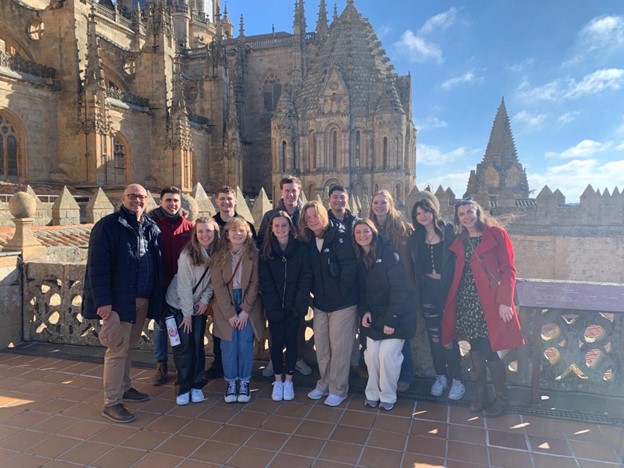
In the spring of 2023, I had the opportunity of a lifetime: to live and work in Spain. I served as Faculty Member in Residence (FMIR) for JMU’s long-running Semester in Spain study abroad program, established in 1984. While moving my family to Europe for three months did come with challenges, we all took rather quickly to the slow pace of life in our new home base of Salamanca, Spain. It is a lovely old-world university town, home to the Universidad de Salamanca, founded in 1218. With the JMU office in Salamanca located just off the Plaza Mayor - the heart of the city and a common gathering space for residents and tourists alike - our typical day consisted of strolls through the beautiful Baroque square and the pedestrian-friendly cobblestone streets that wind their way through the city. I taught a course on the Comparative Politics of Spain and the autonomous regions of the Basque Country, Catalonia, and Galicia, which focused on the plurinational country’s fascinating politics, and held daily office hours for our students.
Every other weekend, we traveled around Spain (and Portugal!), exploring some of the Iberian peninsula’s breathtaking beauty and vibrant cultures. We toured cathedrals from many eras, with the range of Moorish, Romanesque, Gothic, Baroque, and Renaissance architectures revealing Spain’s layered and fractured histories. We visited royal gardens in Segovia, the famous Prado and La Reina Sofía art museums in Madrid, ancient ruins in Mérida, the site of a prehistoric cave in Altamira, marvelous views in the mountainous Picos de Europa, the gardens of a royal palace in the coastal city Santander, and much more. Our weekend in Andalucía was a highlight, with stops in Granada for flamenco and the exquisite Alhambra, Córdoba’s awe-inspiring La Mezquita-Catedral, and charming Sevilla where we toured the ancient Royal Alcázar.
I am forever grateful for the experience and am already looking eagerly ahead to the next opportunity to cultivate the love of international exchange and travel in our students (and my kiddos:)). ¡Mil gracias, JMU!
Pictures from FMIR-Salamanca

Featured Alumni
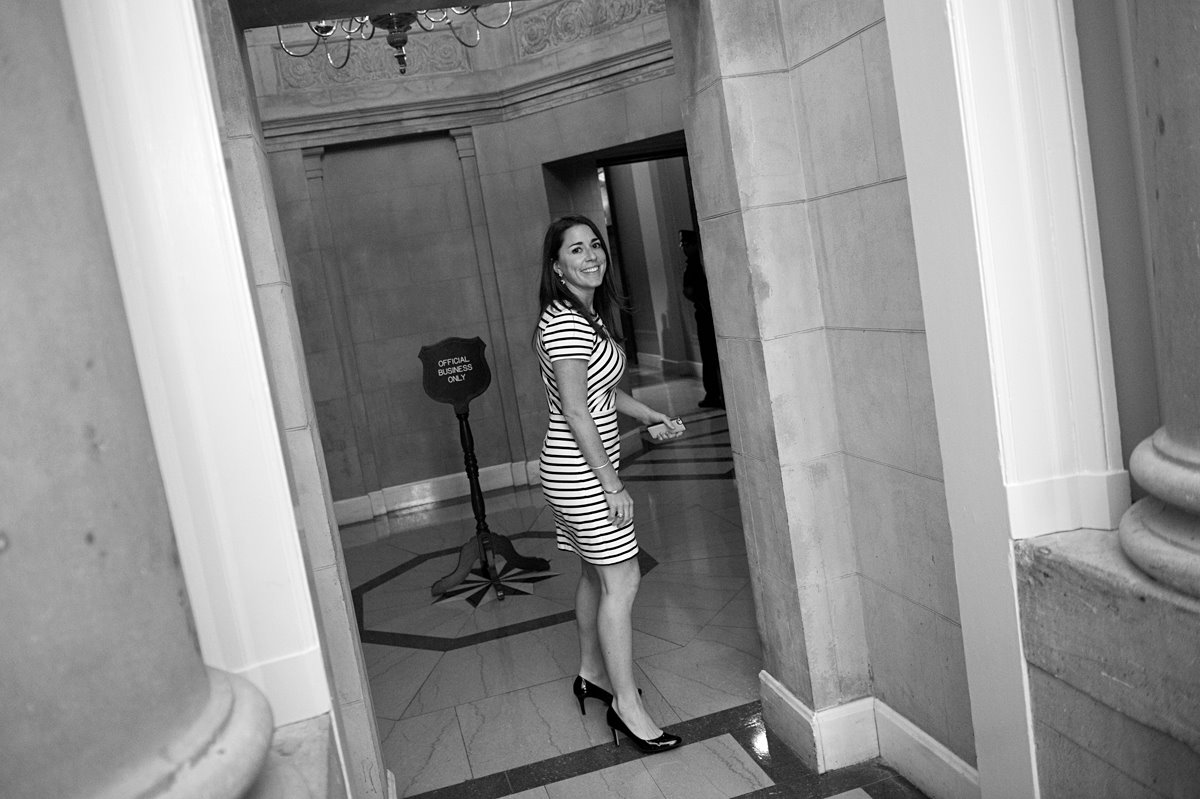 Sarah Massey ('08)
Sarah Massey ('08)
Major: Political Science
Current job:
Senior Director of Communications, North America at The ONE Campaign
Previous professional experience:
Served as Vice President of Media at Edelman, Director of Media Relations for House Speakers Paul Ryan and John Boehner, and Communications Director & Press Secretary at the House Ways and Means Committee.
In what ways did the JMU Political Science Department prepare you for your career?
Outside of a deeper education on the history and principles around governing and policy, a lot of the courses empasized learning presentation skills, working collaboratively on projects, applying critical thinking, defending and debating your ideas in a constructive way, pressing you to think outside the box. All skills that are highly requried when taking Political Science from theory to practice.
Highlights of your JMU experience
The biggest highlight was the people I met and the friendships I made. JMU was a wonderful experience and you could make of it waht you wanted to; I only regret not trying to explore more courses, clubs, opportunities around campus. In terms of courses, my political campaigns class and political communications courses were my most exciting. They were taken in my senior year and sparked my desire to continue in this direction.
Advice to students who are studying Political Science, International Affairs, or Public Administration at JMU
Don't stress too much about where your career might start or end, think about how you can get as much diverse experience and education within or outside the program that can help shape what your first step may be. Create relationships with the people in your classes, learn about their experiences, how their backgroud shapes how they view these fields. Also, use interships to get as much exposure to how this education and skills apply in a professional space - NGOs, associations, federal or local government, public relations. You'll build an incredible portfolio of skills, mentoring, and hopefully create long-term relationships that can help personally and professionally in the future.
Christopher Mulkins ('00)
Major: International Affairs
Minors: Economics and German
Graduate Degrees:
M.A. with Distinction in Contemporary European Studies ('02), University of Bath, England
M.P.A, M.A. in International Relations, Maxwell School of Citizenship and Public Affairs, Syracuse Univeristy ('08)
Current job:
Director of Homeland Security on the U.S. Senate Homeland Security and Govenmental Affairs Committee
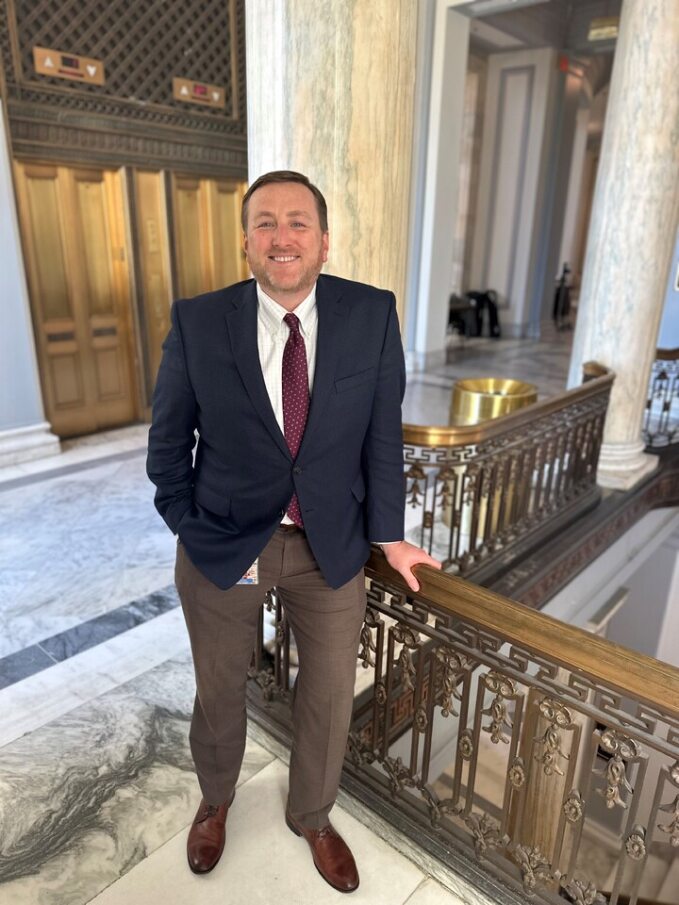
Previous professional experience:
I was a Senior Analyst on the International Affairs and Trade Team at the U.S. Government Accountability Office (GAO) for 11 years. During that time I reviewed a variety of federal programs and activities, including U.S. efforts to build foreign partner security forces capacity, international development assistance, U.S. embassy management, and visa issuance. I was also posted to GAO’s office at the U.S. Embassy in Kabul, Afghanistan for 8 months during 2011 and 2012 to help the agency provide oversight of U.S. government activities in the country. Before joining GAO, I worked as a regional advisor to Senator Hillary Rodham Clinton in Syracuse, New York and as a policy advisor at the Center for European Policy Studies conducting immigration and asylum research in Brussels, Belgium.
In what ways did the JMU Political Science Department prepare you for your career?
The Political Science Department at JMU was instrumental in providing me with a fundamental knowledge of international relations and political science that laid the foundations for my career in government. The department's strong commitment to student success and the development of programs and initiatives to help their students achieve their academic and career goals are superb. In addition, personalized advising and mentorship helped me figure out what I wanted out of my career and how best to get there. I can't speak highly enough of JMU's Political Science Department.
Highlights of your JMU experience
My four years at JMU was a wonderful time in my life. In addition to my studies, being an active Student Ambassador where I was able to share with prospective students the many offerings that JMU provided, was a definite highlight in my college career.
Advice to students who are studying Political Science, International Affairs, or Public Administration at JMU
Do not be afraid to try new things and figure out what you do not like as much as you like. The opportunities provided by the university and the department allow you to explore new topics and potential career paths and expose you to ideas that you may not have thought would interest you. Take advantage of all of those. Part of the reason I feel like I have found a career that is so rewarding is that I tried many things and determined that wasn't the path I wanted to take.

